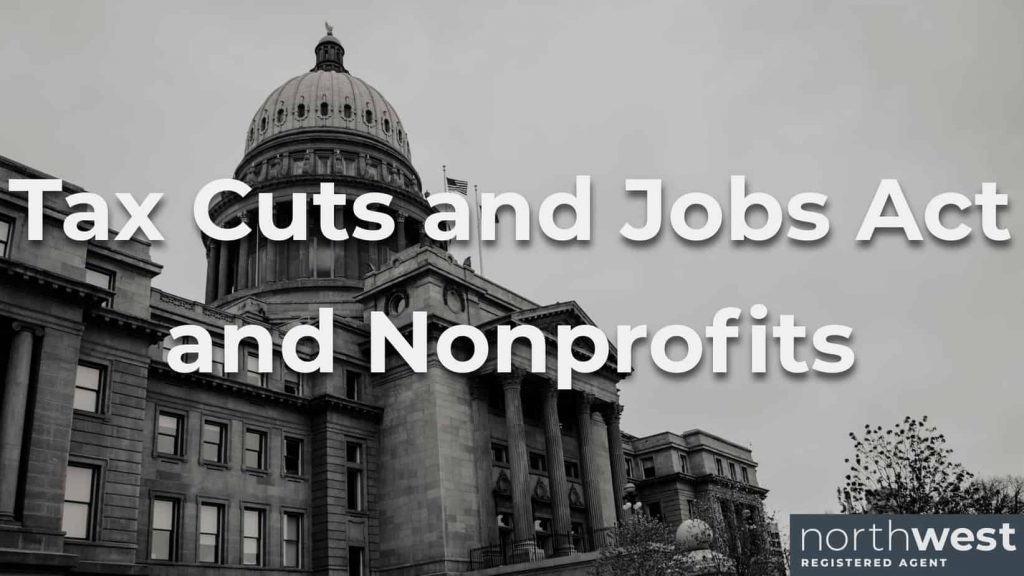What Does the Tax Cuts and Jobs Act Mean for Your New Nonprofit?

If you’re planning to start a 501(c)(3) nonprofit charity in 2019, now is the time to examine the potential impact of the 2017 Tax Cuts and Jobs Act (TCJA) on the nonprofit sector. A new nonprofit’s chances of success will likely depend on its ability to navigate the fallout of the TCJA.
Changes to the Standard Deduction in the TCJA
The major financial incentive for donors to contribute to 501(c)(3) tax-exempt charities is that such contributions are tax-deductible. How does the Tax Cuts and Jobs Act impact this incentive?
The TCJA nearly doubles the standard deduction for single and joint filers, which means that millions of Americans who would have itemized deductions in the past (and hence actually deducted those contributions on their tax returns) will now benefit more from taking the standard deduction when they file their returns for 2018.
According to Chris Gates, a policy advisor to the Global Social Enterprise Initiative, that means only 5-10% of filers will likely itemize deductions on their 2018 returns and thereafter (down from 35% in previous years).
As a result of the Tax Cuts and Jobs Act, in other words, there is now less of a financial incentive for millions of Americans to donate money to tax-exempt charities.
How Will the TCJA Affect the Nonprofit Sector?
People will still contribute to charities, of course, but we would be foolish to suppose that the tax-deductibility of charitable donations wasn’t a driving force behind many people’s willingness to give.
Indeed, the Tax Policy Center projected that the TCJA’s doubling of the standard deduction would lead to a $12 to $20 billion reduction in charitable giving in 2018.
And the possible impact to the nonprofit sector doesn’t stop there. The National Council of Nonprofits, for instance, estimates that the nonprofit sector could lose between 220,000 and 264,000 jobs as a result of declining charitable contributions.
What Are Your New Nonprofit’s Options?
It’s safe to say that we should expect a significant decline in charitable giving in 2018, and perhaps a more significant decline in 2019 once more donors are aware that they won’t receive any tax benefits from their potential contributions. It’s also fairly clear that starting a new nonprofit is riskier now (both for you and your potential employees) than it was just a few years ago.
Nevertheless, if you seriously desire to start a nonprofit corporation, have a service to provide that is truly needed in your community, and have the wherewithal to create an effective business plan, these changes shouldn’t necessarily stop you in your tracks. The need for the services provided by the nonprofit sector, after all, isn’t going away simply because Congress increased the standard deduction and made life more difficult for struggling nonprofits.
But these developments should prompt a little soul-searching. Starting a nonprofit is risky even in the best of times, so you should ask yourself the following questions before taking any concrete steps toward starting a new nonprofit in the current climate:
- Will your nonprofit’s purpose be unique enough in your community to merit the formation of a new organization?
- Will you have the donor contacts necessary to secure the necessary funding to start and maintain your new nonprofit?
It isn’t unusual for people to start new nonprofits that compete with existing nonprofits that already serve the same purpose in the same communities. The problem isn’t precisely that healthy competition isn’t possible in the nonprofit world. It’s that starting a new nonprofit when an existing one is already serving the community effectively, and in the same capacity, could lead to a loss of important community and social programs that negatively impact the very people your new nonprofit intends to serve.
If you haven’t already developed a healthy donor base (and, if you’re just starting out, you probably haven’t), you’ll almost inevitably draw money from donors who would have otherwise contributed to existing tax-exempt nonprofits instead of yours. Weigh that inevitability carefully, and make sure the services you bring to the table are as necessary to your community as they are personally satisfying to you.



